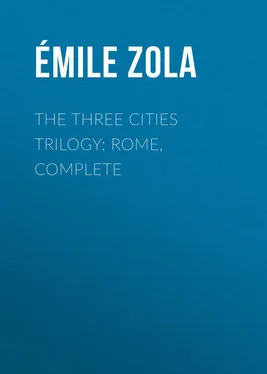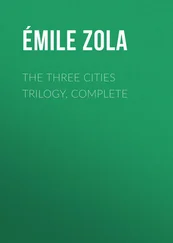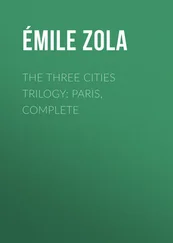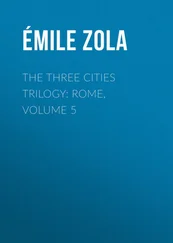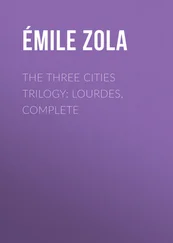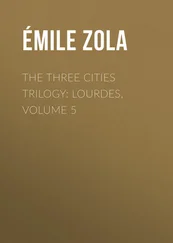Émile Zola - The Three Cities Trilogy - Rome, Complete
Здесь есть возможность читать онлайн «Émile Zola - The Three Cities Trilogy - Rome, Complete» — ознакомительный отрывок электронной книги совершенно бесплатно, а после прочтения отрывка купить полную версию. В некоторых случаях можно слушать аудио, скачать через торрент в формате fb2 и присутствует краткое содержание. Жанр: literature_19, foreign_antique, foreign_prose, на английском языке. Описание произведения, (предисловие) а так же отзывы посетителей доступны на портале библиотеки ЛибКат.
- Название:The Three Cities Trilogy: Rome, Complete
- Автор:
- Жанр:
- Год:неизвестен
- ISBN:нет данных
- Рейтинг книги:5 / 5. Голосов: 1
-
Избранное:Добавить в избранное
- Отзывы:
-
Ваша оценка:
- 100
- 1
- 2
- 3
- 4
- 5
The Three Cities Trilogy: Rome, Complete: краткое содержание, описание и аннотация
Предлагаем к чтению аннотацию, описание, краткое содержание или предисловие (зависит от того, что написал сам автор книги «The Three Cities Trilogy: Rome, Complete»). Если вы не нашли необходимую информацию о книге — напишите в комментариях, мы постараемся отыскать её.
The Three Cities Trilogy: Rome, Complete — читать онлайн ознакомительный отрывок
Ниже представлен текст книги, разбитый по страницам. Система сохранения места последней прочитанной страницы, позволяет с удобством читать онлайн бесплатно книгу «The Three Cities Trilogy: Rome, Complete», без необходимости каждый раз заново искать на чём Вы остановились. Поставьте закладку, и сможете в любой момент перейти на страницу, на которой закончили чтение.
Интервал:
Закладка:
But power had become divided into two parts amidst the crumbling of the Roman empire; it was necessary to content oneself with a share, and leave temporal government to the emperor, retaining over him, however, the right of coronation by divine grant. The people belonged to God, and in God’s name the pope gave the people to the emperor, and could take it from him; an unlimited power whose most terrible weapon was excommunication, a superior sovereignty, which carried the papacy towards real and final possession of the empire. Looking at things broadly, the everlasting quarrel between the pope and the emperor was a quarrel for the people, the inert mass of humble and suffering ones, the great silent multitude whose irremediable wretchedness was only revealed by occasional covert growls. It was disposed of, for its good, as one might dispose of a child. Yet the Church really contributed to civilisation, rendered constant services to humanity, diffused abundant alms. In the convents, at any rate, the old dream of the Christian community was ever coming back: one-third of the wealth accumulated for the purposes of worship, the adornment and glorification of the shrine, one-third for the priests, and one-third for the poor. Was not this a simplification of life, a means of rendering existence possible to the faithful who had no earthly desires, pending the marvellous contentment of heavenly life? Give us, then, the whole earth, and we will divide terrestrial wealth into three such parts, and you shall see what a golden age will reign amidst the resignation and the obedience of all!
However, Pierre went on to show how the papacy was assailed by the greatest dangers on emerging from its all-powerfulness of the middle ages. It was almost swept away amidst the luxury and excesses of the Renascence, the bubbling of living sap which then gushed from eternal nature, downtrodden and regarded as dead for ages past. More threatening still were the stealthy awakenings of the people, of the great silent multitude whose tongue seemed to be loosening. The Reformation burst forth like the protest of reason and justice, like a recall to the disregarded truths of the Gospel; and to escape total annihilation Rome needed the stern defence of the Inquisition, the slow stubborn labour of the Council of Trent, which strengthened the dogmas and ensured the temporal power. And then the papacy entered into two centuries of peace and effacement, for the strong absolute monarchies which had divided Europe among themselves could do without it, and had ceased to tremble at the harmless thunderbolts of excommunication or to look on the pope as aught but a master of ceremonies, controlling certain rites. The possession of the people was no longer subject to the same rules. Allowing that the kings still held the people from God, it was the pope’s duty to register the donation once for all, without ever intervening, whatever the circumstances, in the government of states. Never was Rome farther away from the realisation of its ancient dream of universal dominion. And when the French Revolution burst forth, it may well have been imagined that the proclamation of the rights of man would kill that papacy to which the exercise of divine right over the nations had been committed. And so how great at first was the anxiety, the anger, the desperate resistance with which the Vatican opposed the idea of freedom, the new credo of liberated reason, of humanity regaining self-possession and control. It was the apparent denouement of the long struggle between the pope and the emperor for possession of the people: the emperor vanished, and the people, henceforward free to dispose of itself, claimed to escape from the pope – an unforeseen solution, in which it seemed as though all the ancient scaffolding of the Catholic world must fall to the very ground.
At this point Pierre concluded the first part of his book by contrasting primitive Christianity with present-day Catholicism, which is the triumph of the rich and the powerful. That Roman society which Jesus had come to destroy in the name of the poor and humble, had not Catholic Rome steadily continued rebuilding it through all the centuries, by its policy of cupidity and pride? And what bitter irony it was to find, after eighteen hundred years of the Gospel, that the world was again collapsing through frantic speculation, rotten banks, financial disasters, and the frightful injustice of a few men gorged with wealth whilst thousands of their brothers were dying of hunger! The whole redemption of the wretched had to be worked afresh. However, Pierre gave expression to all these terrible things in words so softened by charity, so steeped in hope, that they lost their revolutionary danger. Moreover, he nowhere attacked the dogmas. His book, in its sentimental, somewhat poetic form, was but the cry of an apostle glowing with love for his fellow-men.
Then came the second part of the work, the PRESENT, a study of Catholic society as it now exists. Here Pierre had painted a frightful picture of the misery of the poor, the misery of a great city, which he knew so well and bled for, through having laid his hands upon its poisonous wounds. The present-day injustice could no longer be tolerated, charity was becoming powerless, and so frightful was the suffering that all hope was dying away from the hearts of the people. And was it not the monstrous spectacle presented by Christendom, whose abominations corrupted the people, and maddened it with hatred and vengeance, that had largely destroyed its faith? However, after this picture of rotting and crumbling society, Pierre returned to history, to the period of the French Revolution, to the mighty hope with which the idea of freedom had filled the world. The middle classes, the great Liberal party, on attaining power had undertaken to bring happiness to one and all. But after a century’s experience it really seemed that liberty had failed to bring any happiness whatever to the outcasts. In the political sphere illusions were departing. At all events, if the reigning third estate declares itself satisfied, the fourth estate, that of the toilers, 7 7 In England we call the press the fourth estate, but in France and elsewhere the term is applied to the working classes, and in that sense must be taken here. – Trans.
still suffers and continues to demand its share of fortune. The working classes have been proclaimed free; political equality has been granted them, but the gift has been valueless, for economically they are still bound to servitude, and only enjoy, as they did formerly, the liberty of dying of hunger. All the socialist revendications have come from that; between labour and capital rests the terrifying problem, the solution of which threatens to sweep away society. When slavery disappeared from the olden world to be succeeded by salaried employment the revolution was immense, and certainly the Christian principle was one of the great factors in the destruction of slavery. Nowadays, therefore, when the question is to replace salaried employment by something else, possibly by the participation of the workman in the profits of his work, why should not Christianity again seek a new principle of action? The fatal and proximate accession of the democracy means the beginning of another phase in human history, the creation of the society of to-morrow. And Rome cannot keep away from the arena; the papacy must take part in the quarrel if it does not desire to disappear from the world like a piece of mechanism that has become altogether useless.
Hence it followed that Catholic socialism was legitimate. On every side the socialist sects were battling with their various solutions for the privilege of ensuring the happiness of the people, and the Church also must offer her solution of the problem. Here it was that New Rome appeared, that the evolution spread into a renewal of boundless hope. Most certainly there was nothing contrary to democracy in the principles of the Roman Catholic Church. Indeed she had only to return to the evangelical traditions, to become once more the Church of the humble and the poor, to re-establish the universal Christian community. She is undoubtedly of democratic essence, and if she sided with the rich and the powerful when Christianity became Catholicism, she only did so perforce, that she might live by sacrificing some portion of her original purity; so that if to-day she should abandon the condemned governing classes in order to make common cause with the multitude of the wretched, she would simply be drawing nearer to Christ, thereby securing a new lease of youth and purifying herself of all the political compromises which she formerly was compelled to accept. Without renouncing aught of her absolutism the Church has at all times known how to bow to circumstances; but she reserves her perfect sovereignty, simply tolerating that which she cannot prevent, and patiently waiting, even through long centuries, for the time when she shall again become the mistress of the world.
Читать дальшеИнтервал:
Закладка:
Похожие книги на «The Three Cities Trilogy: Rome, Complete»
Представляем Вашему вниманию похожие книги на «The Three Cities Trilogy: Rome, Complete» списком для выбора. Мы отобрали схожую по названию и смыслу литературу в надежде предоставить читателям больше вариантов отыскать новые, интересные, ещё непрочитанные произведения.
Обсуждение, отзывы о книге «The Three Cities Trilogy: Rome, Complete» и просто собственные мнения читателей. Оставьте ваши комментарии, напишите, что Вы думаете о произведении, его смысле или главных героях. Укажите что конкретно понравилось, а что нет, и почему Вы так считаете.
